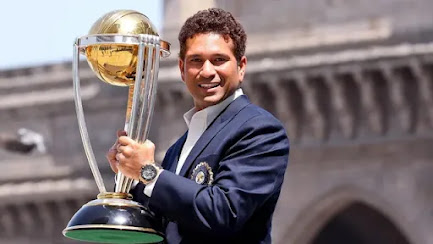About Sachin Tendulkar
Sachin Tendulkar is quite possibly of the most famous cricketer in India as well as across the globe. Nicknamed 'The Little Master' or 'Master Blaster', Tendulkar made his India at 16 and is credited for some records across every single game arrangement. He is the main player to have scored 100 international tons, the principal batsman to score a twofold hundred years in an ODI, the holder of the record for the number of runs in both ODI and Test cricket, and the main player to finish more than 30,000 runs in international cricket. Sachin has been commended with Arjuna Award in 1994, Khel Ratna in 1997, Padma Shri in 1998, and Padma Vibhushan (2008) respects. He is the just sportsperson to be presented with the Bharat Ratna in 2013. Sachin Tendulkar resigned in 2012 at his home ground Wankhede Arena in Mumbai. Since retirement, he's had his self-portrayal distributed called 'Having it My Way' and been the influence of various magnanimous endeavors.
He is known for his batting abilities, strategy, vision, and game perusing. He is all time most runscorersr in both ODI and Test Arrangement with more than 18000 runs and 15000 runs separately altogether. He also holds the record for getting the most Man-of-the-match awards in International Cricket in all consolidated structured. Tendulkar took up cricket at eleven years old, made his Test match debut on 15 November 1989 against Pakistan in Karachi at sixteen years old, and proceeded to address Mumbai locally and India internationally for nearly 24 years. In 2002, partially through his vocation, Wisden positioned him as the second-most prominent Test batsman ever, behind Wear Bradman, and the second-most prominent ODI batsman, behind Viv Richards. Later in his profession, Tendulkar was important for the Indian group that won the 2011 Cricket World Cup, his most memorable success in six World Cup appearances for India. He had recently been named "Player of the Competition" at the 2003 release of the competition.
Awards
Tendulkar got the Arjuna Award in 1994 for his remarkable brandishing accomplishments, the Khel Ratna Award, India's most elevated donning honor, in 1997, and the Padma Shri and Padma Vibhushan awards in 1999 and 2008, separately, two of India's most elevated nonmilitary personnel awards. A couple of hours after the finish of his last match in November 2013, the State leader's Office declared the choice to award him the Bharat Ratna, India's most noteworthy regular citizen award. Starting around 2021, he is the most youthful beneficiary to date and was the first sportsperson to get the award. In 2012, Tendulkar was selected to the Rajya Sabha, the upper place of the Parliament of India.
He is now and again alluded to as "The Divine force of Cricket" in India. A film with that name was delivered in 2021. In 2010, Time magazine included Tendulkar in its yearly Time 100 rundown as quite possibly of the most persuasive individual on the planet. Tendulkar was awarded the Sir Garfield Sobers Prize for cricketer of the year at the 2010 ICC Awards. Having resigned from ODI cricket in 2012, he resigned from all types of cricket in November 2013 in the wake of playing his 200th Test match. Tendulkar played 664 international cricket matches altogether, scoring 34,357 runs. In 2013, Tendulkar was remembered for an unsurpassed Test World XI accumulated 2013 to check the 150th commemoration of Wisden Cricketers' Chronological registry, and he was the main expert batsman of the post-The Second Great War time, alongside Viv Richards, to get highlighted in the group. In 2019 he was enlisted into the ICC Cricket Corridor of Acclaim.
Beginning of His Carrier
Raj Singh Dungarpur is credited for the determination of Tendulkar for the Indian visit to Pakistan in late 1989, after one top-notch season. The Indian choice council had shown interest in choosing Tendulkar for the visit through the West Indies held before that year, yet ultimately didn't choose him, as they didn't believe that he should be presented to the predominant quick bowlers of the West Indies so right off the bat in his vocation. Tendulkar made his Test debut against Pakistan in Karachi in November 1989 maturing 16 years and 205 days. He made 15 runs, being bowled by Waqar Younis, who likewise made his presentation in that match, yet was noted for how he dealt with various hits to his body because of the Pakistani speed assault. In the fourth and last Test in Sialkot, he was hit spot-on by a bouncer bowled by Younis, yet he declined clinical help and kept on batting even as he spouted blood from it.
In a 20-over show game in Peshawar, held in lined up with the reciprocal series, Tendulkar made 53 runs off 18 balls, incorporating an over in which he scored 27 runs (6, 4, 0, 6, 6, 6) off leg-spinner Abdul Qadir. This was subsequently called "quite possibly the best inning I have seen" by the then-Indian commander Krishnamachari Srikkanth. On the whole, he scored 215 runs at a normal of 35.83 in the Test series and was excused without scoring a spat the only One Day International (ODI) he played. Consequently, Sachin Tendulkar turned into the most youthful player to make a big appearance for India in Tests at 16 years old years and 205 days, and furthermore the most youthful player to make a big appearance for India in ODIs at 16 years old years and 238 days.
The series was trailed by a visit through New Zealand in which he scored 117 runs at a normal of 29.25 in Tests including an innings of 88 in the subsequent Test. He was excused without scoring in one of the two one-day games he played, and scored 36 in the other. On his next visit, a late spring visit to Britain in 1990, on 14 August, he turned into the second most youthful cricketer to score a Test century as he made 119 not out in the second Test at Old Trafford in Manchester, an innings which added to a draw and saved India from specific loss in the match. Wisden depicted his innings as "a restrained showcase of monstrous development" and furthermore composed:
Tendulkar further upgraded his standing as a future extraordinary during the 1991-92 visit to Australia held before the 1992 Cricket World Cup, which incorporated an unbeaten 148 in the third Test at Sydney, making him the most youthful batsman to score hundred years in Australia. He then scored 114 on a quick, bobbing contribution in the last Test at Perth against a speed assault containing Merv Hughes, Bruce Reid, and Craig McDermott. Hughes remarked to Allan Line at the time that "This little prick will get a greater number of runs than you, Stomach muscle."
Tendulkar's presentation during that time 1994-1999 matched with his actual top, in his mid-twenties. He opened the batting at Auckland against New Zealand in 1994, making 82 runs off 49 balls. He scored his most memorable ODI century on 9 September 1994 against Australia in Sri Lanka at Colombo. It took him 78 ODIs to score his most memorable hundred years. Tendulkar's ascent proceeded when he was the main run scorer at the 1996 World Cup, scoring two centuries. He was the main Indian batsman to perform well in the semi-last against Sri Lanka. Tendulkar fell amid a batting breakdown and the match ref, Clive Lloyd, awarded Sri Lanka the match after the group started revolting and tossing litter onto the field.
Captaincy
Tendulkar's two residencies as chief of the Indian cricket crew were not exceptionally fruitful. When Tendulkar took over as chief in 1996, it was with gigantic expectations and assumptions. In any case, by 1997 the group was performing ineffectively. Azharuddin was credited with saying "Nahin jeetega! Chote ki naseeb principal jeet nahin hai!", which converts into: "He won't win! It's not in the little one's predetermination!".
Tendulkar, succeeding Azharuddin as chief for his subsequent term, drove India on a visit through Australia, where the guests were beaten 3-0 by the recently delegated title holders. Tendulkar, notwithstanding, won the player of the series award as well as the player of the match in one of the games. After another Test series rout, this time by a 0-2 edge at home against South Africa, Tendulkar surrendered, and Sourav Ganguly took over as chief in 2000. During the Indian group's 2007 visit to Britain, the craving for Rahul Dravid to leave the captaincy became known. The Leading body of Control for Cricket in India (BCCI) President Sharad Pawar offered the captaincy to Tendulkar, who rather prescribed Mahendra Singh Dhoni to assume control over the reins. Pawar later uncovered this discussion, crediting Tendulkar for first sending the name of Dhoni, who since made a lot of progress as skipper.
Retirement
Tendulkar reported his retirement from One Day Internationals on 23 December 2012, while taking note that he will be accessible for Test cricket. In light of the news, previous India captain Sourav Ganguly noticed that Tendulkar might have played the impending series against Pakistan, while Anil Kumble said it would be "hard to see an Indian (ODI) group list without Tendulkar's name in it", and Javagal Srinath referenced that Tendulkar "impacted how ODIs were played right from the time he opened in New Zealand in 1994".
After playing a Twenty20 International in 2006 against South Africa, he said that he wouldn't play the configuration once more. He declared his retirement from the IPL after his group, Mumbai Indians, beat Chennai Super Rulers by 23 runs at the Eden Nurseries in Kolkata on 26 May to win the Indian Chief Association 2013. He resigned from Twenty20 cricket and restricted overs cricket, in the wake of playing the 2013 Bosses Association Twenty20 in September-October 2013 in India for Mumbai Indians.
On 10 October 2013 Tendulkar reported that he would resign from all cricket after the two-Test series against West Indies in November.









0 Comments